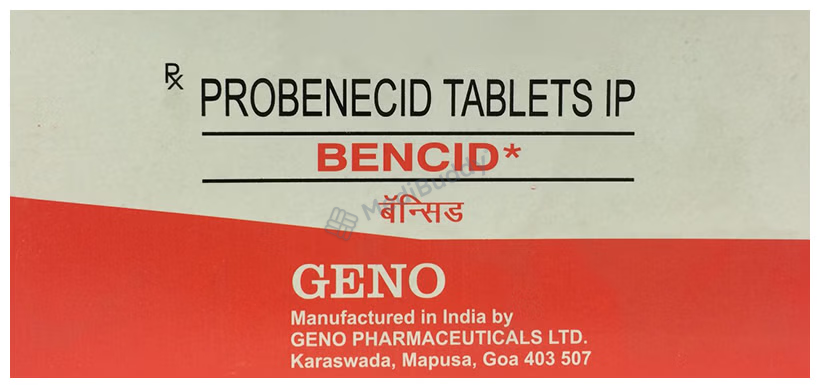Bencid Tablet
By Bencid
Rx
10 Tablet in a Strip

Composition
Probenecid(500mg)

Manufacturer - Geno Pharmaceuticals Ltd
Geno Pharmaceuticals Pvt. Ltd., Pharmaceutical Complex, Tivim Industrial Estate, Karaswada, Mapusa, Goa - 403 526

Expires on or after
July, 2025

liver
Limited information is available regarding the use of Bencid Tablet in patients with liver disease. We advise consulting your doctor for proper guidance before using this medication to ensure safety and effectiveness. Your doctor can evaluate your specific condition and provide personalized recommendations to minimize any potential risks associated with liver issues. It is important to prioritize your liver health, so seek medical advice before starting Bencid Tablet if you have any liver concerns.

kidney
Caution should be taken when using Bencid Tablet in patients with kidney disease. Dose adjustment may be necessary, so consult your doctor. Avoid using Bencid Tablet in cases of severe kidney disease.

alcohol
When taking Bencid Tablet, it's important to be cautious when consuming alcohol. It is recommended to seek advice from your doctor before combining the two.

driving
If you have symptoms like difficulty concentrating or slow reaction times while using Bencid Tablet, avoid driving. Safety while driving after taking Bencid Tablet is uncertain.

pregnancy
It is better to consult your doctor before using Bencid Tablet during pregnancy.

breastfeeding
When breastfeeding, it is considered safe to use Bencid Tablet based on limited human data indicating no significant risk to the baby.
| Habit Forming | No |
| Chemical Class | Benzoic Acid Derivative |
| Therapeutic Class | PAIN ANALGESICS |
| Action Class | Uricosuric agent-gout |
₹74.75
Inclusive of all taxes
Content verified by

Dr. Monie Riju Simon
MBBS - General Medicine
Last update on 11-Feb-2025



